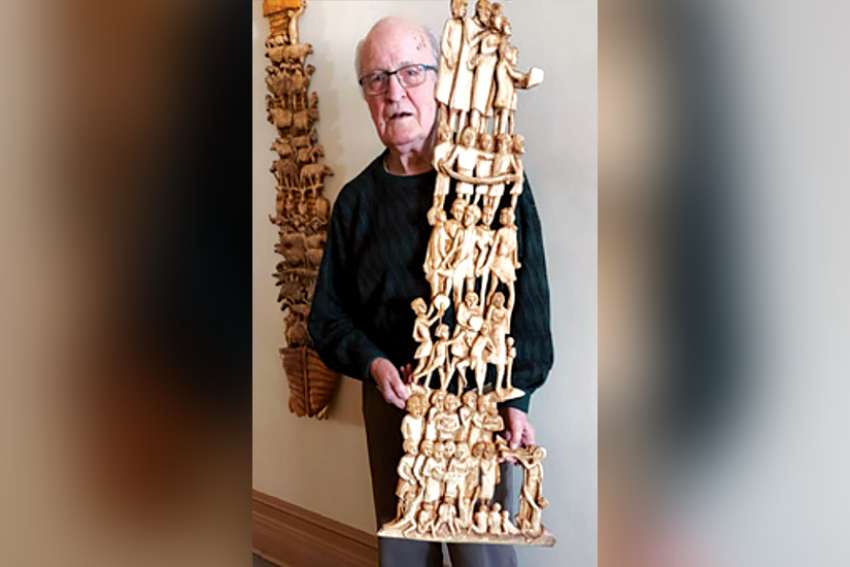Though A Celebration of Life and Art may be tough to get shipped and wrapped under the Christmas tree, the book by Mosaic Publishing will be readily available come the new year.
One of the few artists engaged in Catholic-themed art, Falke hopes the beauty and the challenge of the images put forth will speak to people throughout the Christmas season, into the new year and beyond.
Given the freedom from his editor to curate the book however he would like, for the retired priest, this book is the artistic story of the evolution of him as a man and member of the religious community whose passion for art has been non-stop over the years. The 93-year-old, who lives in Ottawa, can still usually be found in his studio working on a new sculpture. The latest is one of the Samaritan woman, for no particular reason other than to keep his hands busy.
With decades of stories to tell, the author of several texts on his art over the years says this book is perhaps his most personal yet.
“In this book I proposed how I felt the book should be and what images should be used, leaving (my editor) more or less free to agree or disagree and he practically left it up to me,” said Falke. “It’s exceptional if he had a word or a phrase that he changed. It’s my book, no doubt.”
The book paints a chronological history of his life and art from his roots in Holland, development as a young artist, his personal renaissance which occurred during his years in Uganda in the 1960s and ’70s, resettlement in Canada, right through to his golden years.
Falke is author of other titles such as Spirit and Life in Sculpture, From Uganda with Love, Scripture Sculptures in Wood and Clay and Sculpted Swan Songs. What sets A Celebration of Life and Art apart, he says, is his intentionality in providing detailed information about each piece of art included. Expecting the biblical imagery to be obvious to most readers, in previous coffee table books he left the art to speak for itself. With many not as versed in the Scriptures as he might be, Falke later came to learn that it was not enough context for some of his readers.
“I realized much later that even my best parishioners and friends still had no idea about two-thirds of all these images that I gave to them, what they meant,” said Falke. “Here in this book I intentionally made sure each painting and sculpture is explained in the text. It’s the opposite of my first books. Slowly I’ve come to realize that people are more illiterate with regards to Christian images than I expected.”
For Falke, the book also reflects on the issues that have deeply concerned him in his art. Chapter seven tackles his frustrations around the areas he feels the Church needs to be more progressive, such as the role of women and greater acceptance of scientific advancement. Some of his more controversial pieces, such as those depicting a mother Earth, and how the failure to curb sexual excess impacts spiritual complicity and evolutionary stagnancy, stand as contemplations on the state of our world. The artist, who doesn’t own a cell phone, has also expressed concern for the loneliness that many are facing due to technology and apathy with human suffering.
Falke has been frustrated by a lack of will by many to usher the Church into more modern times. The ancient language in the breviary he uses daily and the language in Mass readings and prayers he finds too ancient and tied to tradition. Recognizing his views might be a challenge to some, he’s preferred throughout the years to allow his art to do that talking.
Despite such challenges, Christianity has been a great good in his life.
“I have remained faithful to the practices of the Church because it has great value, and it has proven to be of great value,” said Falke. “I’m too old to say I’m going to change it. It’s not I that can do that. I’m willing to wait for other people who are experts to come up with ways to salvage the beautiful things of Christianity.”


